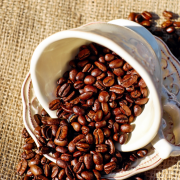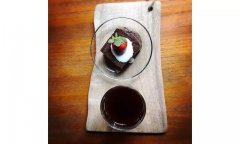Panamanian coffee types and prices

Professional barista communication, please pay attention to coffee workshop (Weixin Official Accounts cafe_style )
Hand-washed Panama. 15g powder, medium grinding (small Fuji ghost tooth knife 4 grinding), v60 filter cup, 88-89 degrees water temperature, the first injection of 30g water volume, 27 seconds of stewing, injection to 105g water volume cut off water, wait for the powder bed water volume to drop to half, then inject water slowly until 225g water volume, tail section do not, water powder ratio 1:15, extraction time 2:00
Panama Coffee is known for its summertime of Emerald Estate, and Emerald Estate is also known for its Boquete region in Chiriqui province. Boquete is a town of Chiriqui in the province of Riquí, located near the border between Panama and Costa Rica, close to the famous Baru volcano, beautiful scenery, rich soil, climate and soil very suitable for producing high-quality coffee.
Since 2006, Elida's selected batches have been ranked as the best Panamanian winners every year. The price is expensive every year. Among the Central American estates, Elida should be regarded as the most "Kenyan blackberry notes". Its black berries and persistent complex fruit flavors are often praised. The judges also flocked to Elida's unique "fresh delicious", which comes from "Umami". At present, many experts include "umami" in the five tastes (sour, bitter, salty and fresh). The effect of umami is similar to monosodium glutamate. Food that freshens or makes soup, such as dried mushrooms, dried cheese and kelp, can be found in the existence of umami. The umami flavor in coffee is associated with a good "aftertaste," such as a long and pleasant aftertaste after sipping, which is a delicious taste experience.
The equipment, appliances and processing steps of Elida's processing field are all exquisite. Generally speaking, if the water content of coffee fruits processed to a certain stage exceeds 20% for a long time, the good quality ingredients in coffee fruits are not only easy to lose, but also may produce peculiar smell. In addition, Elida's processing field is still high in altitude, so there is a dedicated processing equipment to control the temperature and time during drying. This must be controlled properly. it is also an important and critical step involving quality.
This batch is treated by solarization, and the variety is a classic iron pickup. Typica: The oldest indigenous variety of Ethiopia, native to Ethiopia and southeastern Sudan, from which all Arabica is derived. Elegant flavor, but weak constitution, poor disease resistance, fruit yield less. Jamaica Blue Mountain, Sumatra Mantning, Hawaii Kona and other excellent estate beans belong to Tibika. The top leaf of tibeka is red copper color, called red top coffee, tibeka belongs to arabica.
More than half of the area is in the Panama National Park Reserve. It is a rare ultra-high altitude estate in Central America. According to the feasibility of the terrain, coffee is grown at 1,700 meters to nearly 2,000 meters. It is known for its "rich and delicious" main flavor.
Alida Manor, owned by its owner, Weaver Ramos, grows three varieties, including Tiberias, Crescents and Catalans, which are cultivated in nursery areas. The road to the manor was beautiful. At 1,700 meters, the air became cold. It was like walking in the mountains to enjoy the forest bath and breathe the fresh air. The two-kilometer terrain of the manor was broken and steep. After crossing the ridge line and reaching the saddle, it was actually flat and open land. The terrain could avoid the howling mountain wind. Weaver says this is the best place to grow roses!
Flavor Description: Rich tropical fruit, strawberry aromas, black plum, apricot, peach, longan, rich fruit wine aromas.
Factory Name: Front Street Cafe
Net content: 227g
Packing: Bulk
Coffee beans ripeness: coffee ripe beans
Sugar: No sugar
Origin: Panama
Degree of roasting: medium roasting
Typica is a tall cultivated variety of Arabica, originating from Yemen to Java and circulating in Java in the early 18th century.
Ethiopia's oldest native variety, all Arabica derived from Tibica. Tiebika has bronze top leaves, oval or thin pointed bean body, elegant flavor, weak constitution, poor disease resistance and low fruit yield. Jamaica Blue Mountain, Sumatra Mantning, Hawaii Kona and other excellent estate beans belong to Tibika.
Its plants are very similar to what we call Java today, with bronze-tipped young leaves, large fruits and seeds, very low yields, and vulnerability to all major pests.
Panama Boquete Elida Typica Natural
Country: Panama
Grade: SHB
Production area: Poquet
Degree of roasting: medium roasting
Treatment: Sunlight
Type: Iron Pickup
Flavor: Rich tropical fruit, strawberry, black plum
Baru is a young volcano, more than 3,400 meters above sea level, is an active volcano, surrounded by seven different micro-climate zones, brewing rich and diverse ecology. The diverse microclimate has both advantages and disadvantages for coffee cultivation, but for Elida, her flavor is stronger and more aromatic than most Panama beans. The black berry aftertaste and varied taste become the main reasons why consumers love her.
However, high altitude terrain has its disadvantages. For example, Elida, the average altitude at which coffee is grown is more than 1,700 meters. The terrain is high and the temperature at night is low. Coffee can be harvested five years after planting, and the waiting period for harvest is very long. After entering the harvest period, the coffee ripening period is often more than a month, before ripening once the weather is abnormal, such as typhoon, heavy rain and other irresistible factors come, knowing that will cause heavy losses, but because the beans are not ripe, under the quality of insistence, because of not rushing to harvest, the harvest will drop sharply, the risk is actually much greater than that of low-altitude plantations.
Important Notice :
前街咖啡 FrontStreet Coffee has moved to new addredd:
FrontStreet Coffee Address: 315,Donghua East Road,GuangZhou
Tel:020 38364473
- Prev

What's the taste of Sidamo in the sun? how does Sidamo coffee brew?
Professional barista communication please pay attention to the coffee workshop (Wechat public number cafe_style) factory name: Qianjie Cafe address: Guangzhou Yuexiu District Baoqian Street 10 manufacturer contact information: 020-38364473 ingredient table: home baking shelf life: 90 net content: 227g packaging: bulk taste: mellow coffee beans ripe degree: coffee beans sugar-free origin: Ethiopia
- Next

Panamanian Alida drinks correctly the price of Panamanian coffee beans
Professional barista exchanges please follow the coffee workshop (Wechat official account cafe_style) Balu is a young volcano, more than 3400 meters above sea level, is an active volcano, surrounded by seven different micro-climatic zones, brewing a rich and diverse ecology. The diverse microclimate has both advantages and disadvantages for coffee cultivation, but for Arida, her flavor is stronger and fragrant than most Panamanian beans.
Related
- Detailed explanation of Jadeite planting Land in Panamanian Jadeite Manor introduction to the grading system of Jadeite competitive bidding, Red bid, Green bid and Rose Summer
- Story of Coffee planting in Brenka region of Costa Rica Stonehenge Manor anaerobic heavy honey treatment of flavor mouth
- What's on the barrel of Blue Mountain Coffee beans?
- Can American coffee also pull flowers? How to use hot American style to pull out a good-looking pattern?
- Can you make a cold extract with coffee beans? What is the right proportion for cold-extracted coffee formula?
- Indonesian PWN Gold Mandrine Coffee Origin Features Flavor How to Chong? Mandolin coffee is American.
- A brief introduction to the flavor characteristics of Brazilian yellow bourbon coffee beans
- What is the effect of different water quality on the flavor of cold-extracted coffee? What kind of water is best for brewing coffee?
- Why do you think of Rose Summer whenever you mention Panamanian coffee?
- Introduction to the characteristics of authentic blue mountain coffee bean producing areas? What is the CIB Coffee Authority in Jamaica?

